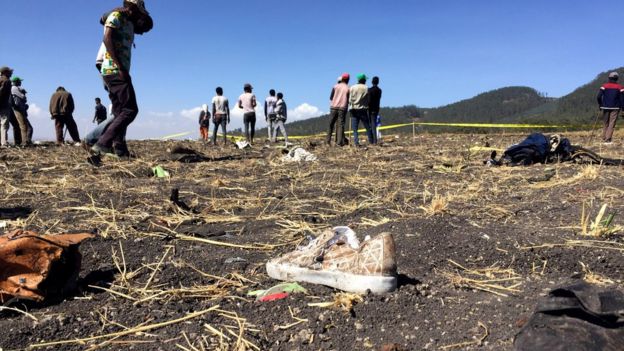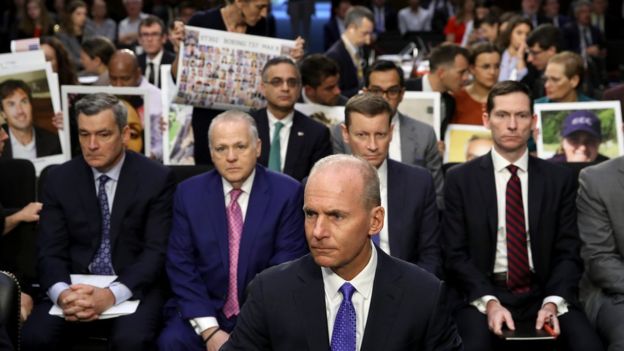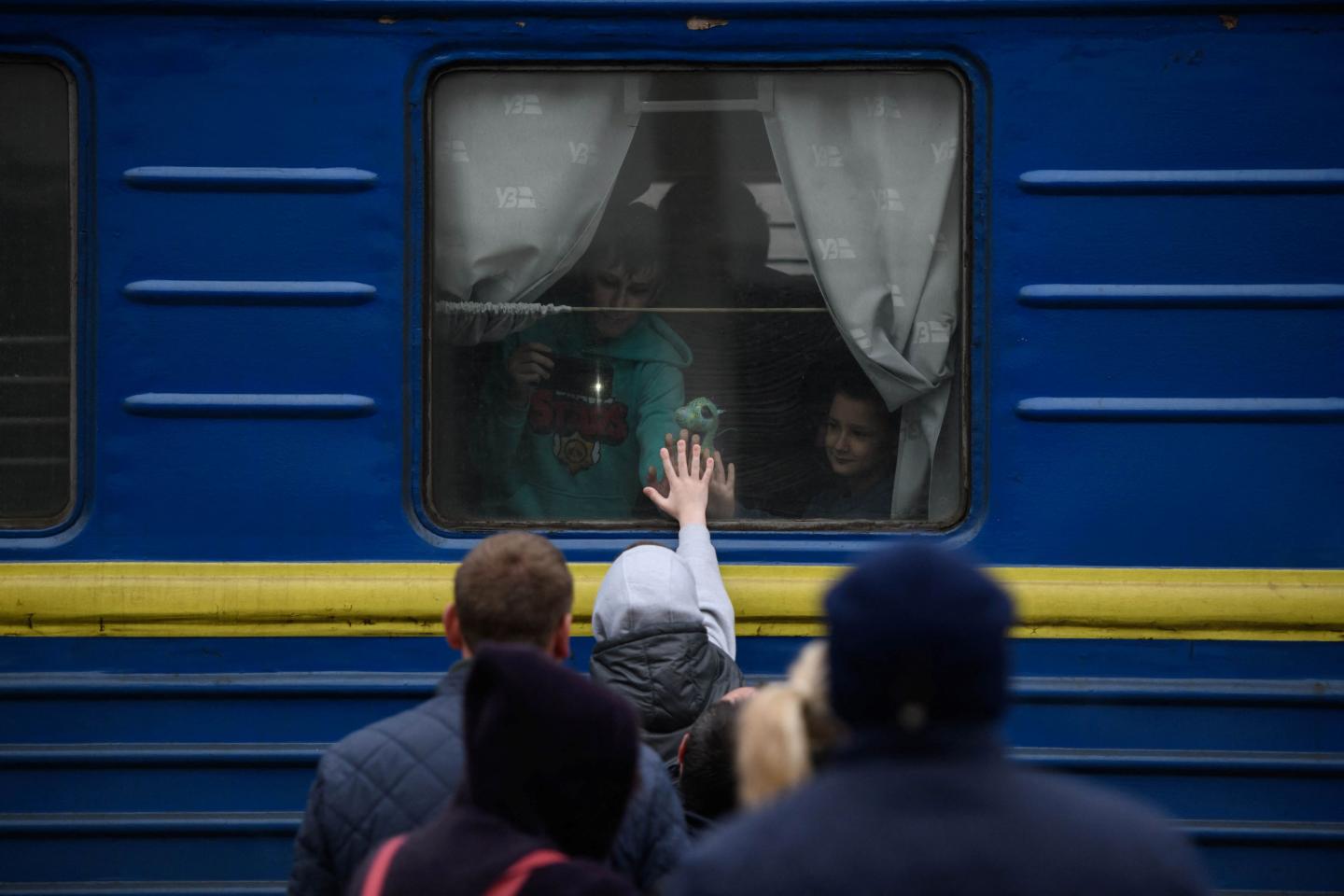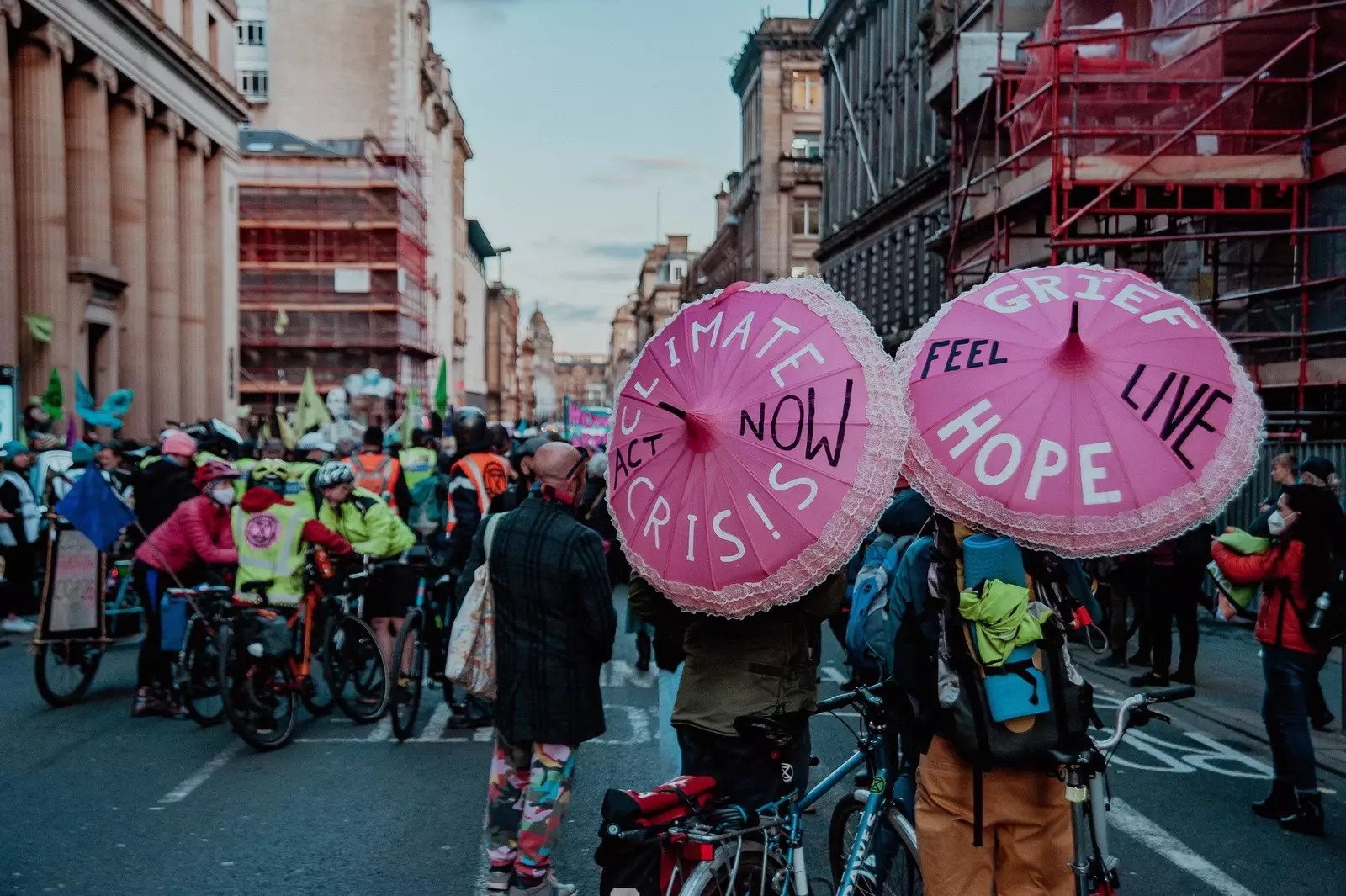Boeing chief fired but 737 concerns persist
Boeing has fired its chief executive, Dennis Muilenburg, in a bid to restore confidence in the firm after two deadly crashes involving its 737 Max plane.
More than 340 people died in the disasters, prompting accusations that Boeing put profit before safety.
Families of the victims welcomed Mr Muilenberg’s resignation as overdue.
But they said Boeing’s decision to replace him with a long-time board member raised questions about its commitment to change.
Boeing named David Calhoun, who has served on the firm’s board since 2009 and is its current chairman, as chief executive and president.
“While the resignation of Mr Muilenburg is a step in the right direction, it is clear that the Boeing Company needs a revamp of its corporate governance,” said Paul Njoroge, who lost his wife, three children and mother-in-law when Ethiopian Airlines Flight 302 crashed in March.
Mr Calhoun “is not the right person for the job”, he added.
- What went wrong in Boeing’s cockpit?
- Boeing to temporarily halt 737 Max production in January
- US regulator knew of Boeing 737 crash risks
- Boeing ‘is not a trustworthy company anymore’
Zipporah Kuria, whose father was also killed on the Ethiopian Airlines flight, said Mr Muilenburg should have been replaced “a long time ago” but responsibility for the crashes is shared.
“I feel as though a lot more people should have resigned including the person who’s becoming CEO,” she told the BBC.
‘Necessary’ change
Boeing has been under intense scrutiny since two 737 Max planes crashed within five months of each other, first in Indonesia and then in Ethiopia.
The 737 Max fleet has been grounded worldwide since March.
While the company had been hoping to have the best-selling jet back in the air by the end of this year, US regulators have made it clear that it would not be certified to return to the skies that quickly.

Last week, Boeing said it would halt production of the aircraft.
Then on Friday, the company’s reputation took another hit when its Starliner spacecraft suffered technical problems that prevented it from taking the right path to the International Space Station.
Boeing’s board said it had “decided that a change in leadership was necessary to restore confidence in the company moving forward as it works to repair relationships with regulators, customers, and all other stakeholders”.
Mr Calhoun, a private equity executive, will take over from 13 January.
Lawrence Kellner, a board member since 2011, is to become non-executive chairman immediately.
“Under the company’s new leadership, Boeing will operate with a renewed commitment to full transparency, including effective and proactive communication with the FAA [Federal Aviation Administration], other global regulators and its customers,” it said.
Despite the ouster, some of the firm’s harshest critics in Washington said they still had questions about the firm’s commitment to change.
Senator Richard Bumenthal said: “The company needs new leadership across the board who will take safety seriously.”
The company needs new leadership across the board who will take safety seriously. In the meantime, Boeing must disclose all documents & employee communications relating to possible defects on its aircraft.
— Richard Blumenthal (@SenBlumenthal) December 23, 2019
Michael Stumo, who lost his daughter Samya Rose on the Ethiopian Airlines flight and has organised victims’ families against Boeing, called the resignation a “good first step toward restoring Boeing to a company that focuses on safety and innovation”.
“The next step is for several board members who are underperforming or unqualified to resign,” he said.
‘Software problem’
Air safety officials investigating the tragedies have identified an automated control system in the plane, known as MCAS, as a factor in both crashes.
Boeing has said the MCAS software system, which relied on a single sensor, received erroneous data, which led it to override pilot commands and push the aircraft downwards.
It has said it is fixing the software and has overhauled its review procedures.
But US lawmakers, who are investigating the company, have said the firm was aware that the software system could be unreliable. They have accused the company of trying to hide the risks and rush the plane back into service.

Congressman Peter DeFazio, who leads a committee investigating Boeing, had called for Mr Muilenburg’s resignation in an interview with the New York Times, published over the weekend.
In a statement on Monday, he said the shake-up was “long overdue”.
Mr Muilenburg first joined Boeing in 1985. He led the company’s defence, space and security division prior to his appointment as chief executive in 2015.
He was stripped of his role as chairman of Boeing’s board of directors in October and later agreed to give up his bonus. However, Boeing, including Mr Calhoun, had continued to express confidence in him.


Dennis Muilenburg’s departure was inevitable, although the timing was unexpected.
Since the two accidents, he has faced intense criticism over the corporate culture that existed at Boeing on his watch, and over the company’s relationship with regulators.
Questions have been asked about how a seemingly flawed aircraft was allowed into service in the first place, and why it was allowed to continue flying after the first accident. There have been claims – emphatically denied by the company – that it prioritised profits and speed of production over safety.
His response to the crisis has also come under fire. Although he insisted that Boeing “owned” its failures, he also repeatedly said that the crashes were the result of a chain of events. This was seen by some as an attempt to divert blame away from the aerospace giant.
The final humiliation came last week, when Boeing announced it would have to suspend production of the 737 Max, because regulators had yet to clear the aircraft as safe to fly again. For months, Mr Muilenburg had insisted the plane would be back in the air by the end of the year.
He had lost credibility, and the board decided he had to go.






